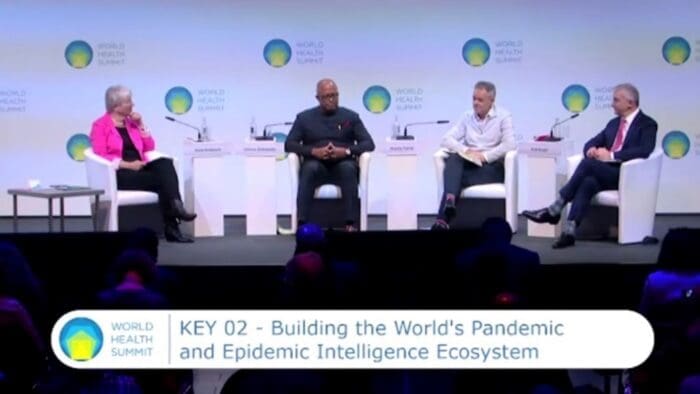“Is it even possible? What will it take?” Every day I hear variations on these questions from scientists, government officials, media, and concerned citizens from every walk of life. Each of them wants to know, as Covid-19 surges and the threat of new variants remains, whether it is possible to create and coordinate a global early warning system that tracks emerging variants of Covid-19 and also detects and triggers containment of future outbreaks.
On October 25th in Berlin, I shared my thoughts on this alongside Dr. Tedros Adhanom Ghebreyesus, Director-General, World Health Organization and Sir Jeremy Farrar, Director, Wellcome Trust, at the World Health Summit. My message was clear:
“No one organization can strengthen the global pandemic and epidemic intelligence ecosystem alone. Fortunately, individuals, institutions and governments have been stepping up, but we need to do more, and we need to do it together.”
I am proud that our team at the Pandemic Prevention Institute (PPI) is doing its part to achieve this goal. Working with the World Health Organization’s Hub for Pandemic and Epidemic Intelligence and other organizations, we are helping transform global capability for stopping disease outbreaks.

View the full World Health Summit presentation here.
But collaborations are only as strong as their individual members. That’s why for the past several months I’ve been focused on building the PPI into an effective organization. Today, I’m pleased to share a little bit more about our progress to date:
- We’ve secured an investment from The Rockefeller Foundation to provide up to $150 million to develop the PPI. This support is just a portion of what it will take to build a world-class institution capable of working with others to detect, mitigate, and contain pandemic threats as quickly as possible. The PPI will seek new partners to define and invest in a common agenda through the RF Catalytic Capital, Inc. (RFCC), a charitable offshoot that The Rockefeller Foundation created in 2020 to enable foundations, governments, and other like-minded funders to combine resources for social impact and bring about transformational change. Read more here.
- We’ve established strong relationships with key genomic surveillance actors in Africa, Europe, India and the United States. Through support from The Rockefeller Foundation, we are working with researchers, public, private, academic and philanthropic sectors to strengthen local capability to conduct, analyze and share genomic surveillance data and insights that reinforce local, regional and global knowledge while building partnerships and trust among people around the world.
- We’ve begun developing tools that can deliver epidemic and pandemic warning signals to the world—while respecting data privacy and sovereignty. Alongside Wellcome Trust, we recently announced a new collaboration, known as Epiverse, that seeks to develop a technology layer that will enable the aggregation and analysis of disparate data sets. We’re also working on a product pipeline that’s shaped by user-centered design, collaborating with leading partners in the field of wastewater-based epidemiology to identify and fill gaps in understanding how this approach can best be used for pandemic prevention, and building our own analytic tools and algorithms that can be helpful to use across broadly different data sets.
This is just a quick glance at the impactful work we are doing within a few months of standing up the PPI. So, yes, I believe an early warning system that works for all is possible, but only if we work together and only if we do so urgently. We must act with expediency to meet this moment; it’s the only way we can ensure a #PandemicFreeFuture.
I look forward to sharing more updates on our collective progress, and the PPI’s evolution. In the meantime, please reach out with questions and follow us on Twitter @PPI_Insights for the latest updates on the PPI and our partners.
Thank you for your trust, collaboration, and commitment –